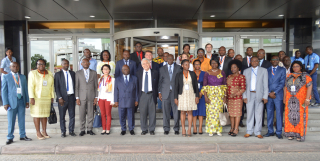
Posted by Gwénaëlle Suc and Abdoulaye Touré[1]
Gender inequalities and inequities remain pervasive in Central Africa. For example, in recent years, about 35 percent of girls graduated from high school in the region, against 45 percent of boys. And women earn on average 30 percent less than men. These inequities have a significant impact on growth and development. Studies show that an increase of one percent in the gender inequality index reduces the human development index by 0.75 percent.
Gender responsive budgeting (GRB) can help reduce these inequalities and inequities. GRB is an initiative to use fiscal policy and public financial management tools and practices to promote gender equality and women’s development.
AFRITAC Central (AFC) organized recently, in partnership with the IMF’s Fiscal Affairs Department (FAD) and UN Women, a regional seminar in Brazzaville to sensitize representatives from both Finance and Women’s Ministries to this approach. The seminar gathered together over 40 people from nine countries (Burundi, Cameroon, Central African Republic, Chad, Republic of Congo, Democratic Republic of Congo, Equatorial Guinea, Gabon, and Sao Tome and Principe) and representatives from the Economic and Monetary Community of Central Africa (CEMAC) Commission, civil society, and the main donors in the region. It was the first event focusing on this topic in sub-Saharan francophone countries. The seminar took place in the context of the annual forum of high-level representatives from budget departments of Central African countries (FOHBAC).
The agenda of the seminar combined lectures, countries’ presentations, workshops, and group discussions, emphasizing the link between gender policies and GRB, and sensitizing participants to the latest GRB practices and tools. Topics included: international conventions promoting gender equality with examples from Central Africa; indicators of gender inequality and inequity in Central Africa; and the impact of gender inequality on countries’ development. FAD’s recent analytical work on gender budgeting was also presented[2], along with the results of FAD’s survey of gender budgeting practices in the region. The survey highlighted generally weak implementation of GRB in the region, although all countries have adopted strategies to reduce gender inequality. Presentations of GRB experiences in Morocco and France emphasized the need for strong leadership by the Ministry of Finance, jointly with the Women’s Ministry, how regular budgeting tools could be adapted for use in GRB, and how program budgeting techniques can facilitate the implementation of GRB.
The seminar benefitted from the strong involvement of participants who prepared an action plan to implement GRB in three stages: (1) ensuring that the legal framework is adequate and preparing tools for implementing and monitoring GRB; (2) testing in a few ministries the implementation of GRB at all phases of the budget cycle; and (3) rolling out GRB in all ministries. The action plan was endorsed as a resolution of the FOHBAC, and participants will present their country’s achievements during the next meeting of the forum. The planned transition of all countries in the region to program budgeting is an opportunity to introduce GRB and to move from gender-blind budgeting to gender-responsive practices.
[1] Gwénaëlle Suc works as an Economist in the Fiscal Affairs Department of the IMF, and Abdoulaye Touré is PFM advisor of AFRITAC Central.
[2] https://www.imf.org/en/Publications/Policy-Papers/Issues/2017/05/12/pp041917gender-budgeting-in-g7-countries
Note: The posts on the IMF PFM Blog should not be reported as representing the views of the IMF. The views expressed are those of the authors and do not necessarily represent those of the IMF or IMF policy.





